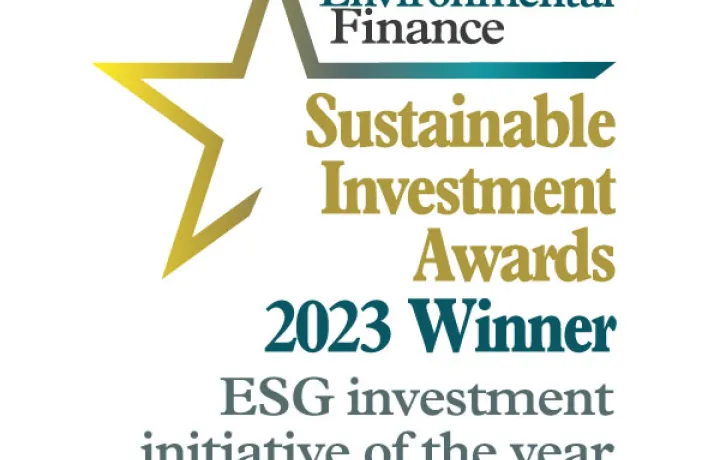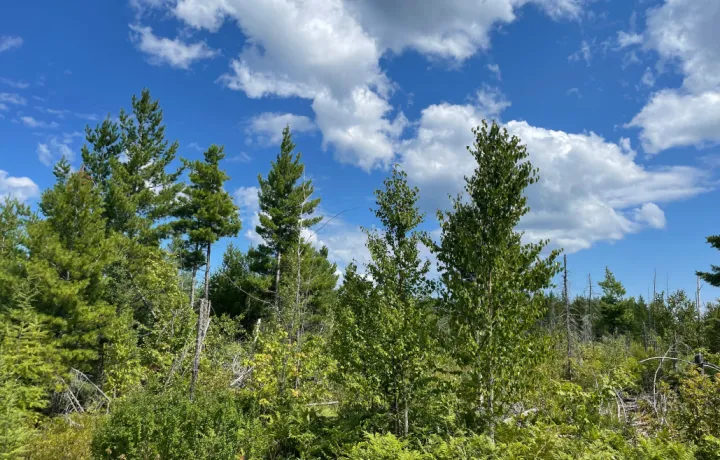Blue Source Sustainable Forests Co. advances its carbon-first strategy and rebrands the company Aurora Sustainable Lands™
Blue Source Sustainable Forests Company (BSFC), a joint venture between Anew Climate and an equity investment consortium led by Oak Hill Advisors, announced today that the company has enrolled 1.65 million acres of historically industrial American forestlands into its carbon-first management projects, shifting the primary use of this land from timber harvesting to long-term carbon sequestration. In the year since the company completed the largest private forest investment of the past decade1, BSFC has created carbon value and sold credits representing 7.5 million tonnes of carbon removals and avoided carbon emissions to climate-conscious companies and organizations seeking to advance their ESG goals and net zero commitments through projects that conserve U.S. forest ecosystems.
In recognition of the company’s implementation of its carbon-first strategy and its expanded vision for actively managing and conserving lands to support decarbonization efforts, BSFC also announced that it has rebranded the company Aurora Sustainable LandsTM. This brand evolution represents the company’s creation of a new climate asset class that addresses mitigation, adaptation, and resilience.
“Aurora Sustainable Lands is a name intended to evoke the relationship between land and the atmosphere,” said Jamie Houston IV, Aurora CEO. “Forests are the original atmospheric carbon removal technology, and the conservation of our trees is critical to making significant progress against climate change.”
As a carbon-first company, Aurora Sustainable Lands invests in historically industrial forestlands. Carbon credits are generated from the company’s forest portfolio spanning 17 states with individual properties selected by in-house carbon experts for their long-term carbon sequestration and storage potential. These high-quality carbon credits are then exclusively marketed and sold by Anew Climate. Going forward, Aurora estimates it can remove four to six million tonnes of carbon dioxide from the atmosphere per year for the next 100 years with its current diversified forest portfolio.
“We are changing natural forest management from primarily timber revenue to carbon as the main revenue source,” said Houston. “The greatest value of formerly industrial forests will come from increasing carbon storage, which in turn improves watersheds, cleans our air, protects critical habitats, and improves biodiversity.”
Carbon removal and storage have been an overlooked and lower priority revenue stream for timber property portfolios. By contrast, carbon removal and storage have been central to Aurora’s business model and mission since its inception in 2021. By conserving and actively managing forests primarily for carbon, the company taps into the planet’s oldest, most effective, and cost-efficient carbon removal tool to deliver Aurora’s customers nature-based carbon credits with unrivaled reliability, durability, and quality.
“Credits from our projects are generated with models and systems honed through years of deep expertise in forest carbon, undergo multiple rounds of auditing, and have the highest level of transparency in the marketplace,” said Cakey Worthington, Aurora Vice President of Carbon Operations. “Because we own the land and our carbon-first mission is directly in line with the goals of the carbon projects, buyers of our credits can achieve their goals with unmatched confidence that their investment has real impact.”
A recent study2 confirmed that companies participating in the voluntary carbon markets as part of an overall decarbonization strategy have more ambitious climate targets, higher investments in emission reduction efforts, and show more actual progress reducing their emissions than those that don’t. Climate, biodiversity, and land preservation goals will soon be out of reach unless investments in nature-based solutions quickly ramp up.3 Peer-reviewed research demonstrates that nature-based solutions could provide more than one-third of the climate mitigation needed by 2030 to keep global warming below 2o C, in line with the Paris Agreement, with forests providing nearly 75 percent of this total.4
“Aurora has the vision, capital, and expertise to acquire large land positions held by traditional timber harvesting companies and transform the land into carbon storage and management platforms,” said W.H. “Bill” Easter, Aurora Board of Managers. “The company’s carbon-first approach will help mitigate climate change by maximizing future carbon capture opportunities through foresighted forest management and deploying the latest technology.”
The company was awarded the 2023 ESG Investment Initiative of the Year, North America, by Environmental Finance. The Land Report recognized Aurora’s innovative approach to forest management and its historic acquisition of The Forestland Group as its 2022 Deal of the Year.
1 Fastmarkets RISI, Major US Timberland Transactions, 1995 – 2022. Forest Capital Partners sale to Molpus and Hancock in 2012 was the most recent, larger transaction.
2 2023 corporate voluntary buyers report, “All in on Climate: The Role of Carbon Credits in Corporate Climate Strategies,” Ecosystem Marketplace, October 2023
3 Natural Climate Solutions. Griscom, et. al. 2017
4 Natural Climate Solutions. Griscom, et. al. 2017
About -
About Aurora Sustainable Lands
Aurora Sustainable Lands is one of the world’s leading carbon removal platforms and climate-focused asset managers. To date, Aurora has acquired over 1.7 million acres of U.S. forestland with a history of industrial logging and now manages these lands with a carbon stewardship management strategy that focuses on maximizing natural carbon removal and storage potential. By actively managing with this strategy and utilizing cutting-edge proprietary technologies, Aurora taps into the oldest and most effective carbon removal tool, trees, to offer nature-based carbon credits with unrivaled reliability, durability, and quality and at an unprecedented scale. Aurora is a joint venture between Anew Climate and a group of equity investors led by Oak Hill Advisors, AB CarVal, EIG and GenZero among other leading financial sponsors.


